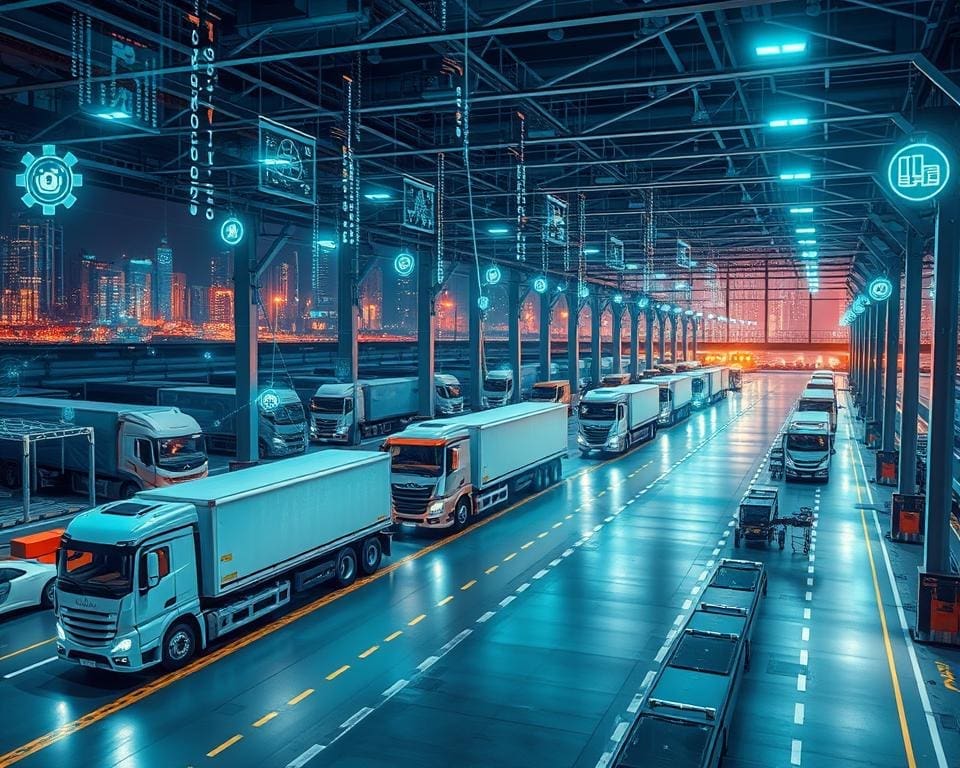The world of logistics is experiencing a profound transformation, driven by the integration of artificial intelligence into truck technology. This innovative approach not only enhances the operational framework of transportation but also makes supply chains smarter and more efficient. With AI at the helm, businesses are now able to utilise advanced systems such as real-time tracking and data analytics, offering unprecedented visibility and enabling quick decision-making. Research by McKinsey highlights that AI could elevate operational efficiency in logistics by as much as 35%, revealing the substantial impact of these advancements on future operations.
The Impact of AI on Logistics
The landscape of logistics is undergoing a significant transformation, largely due to the impact of AI. Companies are embracing this technology to streamline and enhance traditional supply chains. This shift brings forth an era of logistics innovation, enabling businesses to meet evolving market demands with increased efficiency.
Transforming Traditional Supply Chains
AI makes supply chains smarter by introducing data-driven decision-making processes. With advanced algorithms, organisations can optimise their operations, reduce waste, and improve delivery timelines. Notable firms such as Amazon lead the charge in leveraging these capabilities, setting a high standard in inventory management and customer service.
- Streamlined operations through automated inventory control.
- Enhanced customer experience via accurate delivery predictions.
- Cost reduction by minimising excess stock and transportation expenses.
Real-Time Data Analysis
Real-time data analysis stands as a cornerstone in this transformation, allowing logistics providers to monitor shipments seamlessly worldwide. AI systems excel in processing vast data sets to provide insights that drive success.
“Companies utilising AI and real-time analytics experience up to a 20% increase in forecast accuracy.”
Such advancements significantly bolster order fulfilment rates, demonstrating the clear benefits of integrating these technologies into the logistics framework.

Truck Technology: AI Makes Supply Chains Smarter
The integration of AI within truck technology represents a transformative leap in logistics efficiency. Innovative solutions are redefining transportation, significantly enhancing productivity and effectiveness. As businesses embrace these advancements, a new era of smarter supply chains emerges.
Innovative Solutions in Transportation
Recent developments showcase how AI is revolutionising the transportation sector. Autonomous vehicles, advanced routing software, and predictive analytics are becoming commonplace. These technological innovations allow for:
- Optimised fuel consumption through intelligent routing.
- Enhanced safety features that reduce accidents while on the road.
- Improved delivery accuracy led by real-time data.
Case Studies of Successful Implementation
Numerous companies are successfully harnessing AI-driven solutions to elevate their logistics operations. For instance, DHL has employed AI analytics to fine-tune delivery routes. This approach has resulted in:
- Significant cost reductions.
- Faster delivery times, enhancing customer satisfaction.
Furthermore, research in the Journal of Supply Chain Management highlights smart logistics platforms that boost operational agility and support informed decision-making. The advancements in truck technology not only promise better transportation but herald a future where every supply chain can maximise its potential.
Enhancing Efficiency Through AI
As industries look to streamline their operations, enhancing efficiency remains a pivotal goal. The integration of AI in fleet management brings transformative capabilities, particularly in automating processes that previously demanded significant human labour. With logistical challenges ever-present, technology steps in to alleviate the strain.
Automation in Fleet Management
The advent of logistics technology has enabled businesses to automate critical aspects of fleet management. Tasks such as scheduling, vehicle tracking, and resource allocation can now be handled by AI-driven systems. This transition reduces administrative burdens, allowing personnel to focus on more strategic initiatives. Companies embracing these innovations report notable increases in productivity alongside substantial reductions in operational costs.
Predictive Maintenance and Its Benefits
Another remarkable advancement sits in the realm of predictive maintenance. Leveraging AI technologies, logistics companies gain the ability to forecast potential vehicle failures ahead of time. This forward-thinking approach can significantly diminish unexpected breakdowns, thus safeguarding fleet operation. Maintaining equipment proactively ensures that vehicles remain in service longer and yields greater overall efficiency.
The Future of Transportation and AI
The landscape of transportation is undergoing a transformative shift with the rise of AI trends. Emerging truck technology promises to redefine logistics advancements, fostering a more efficient and sustainable future. The convergence of electric trucks and autonomous driving capabilities sets the stage for revolutionary changes in the industry.
Emerging Trends in Truck Technology
Electric trucks from leading manufacturers like Rivian and BYD are gaining momentum, driving significant reductions in emissions and operational costs. These innovations represent a crucial element of future transportation, aligning with global sustainability goals. Furthermore, the integration of AI with the Internet of Things (IoT) enhances connectivity, paving the way for smarter transport ecosystems that optimise resource utilisation.
Alongside these advancements, blockchain technology is becoming an integral part of logistics advancements. Its potential for enhancing security and transparency within supply chains is increasingly recognised by industry leaders. Analysts suggest robust growth in the global AI market for logistics, projecting it to surpass USD 11 billion by 2027, a clear indication of future investment opportunities.
As these trends unfold, the collaboration between traditional logistics operations and cutting-edge technology will forge a promising pathway towards a more innovative future in transportation.
Sustainability and AI in the Supply Chain
The integration of AI into logistics has opened avenues for significant advancements in sustainability. Companies are increasingly recognising the potential of AI for sustainability, focusing on reducing carbon footprint while improving overall energy efficiency. This demonstrates a concerted effort to embrace green technology in logistics operations.
Reducing Carbon Footprint
Implementing AI solutions in supply chains plays a vital role in managing and reducing carbon emissions. Algorithms that optimise delivery routes contribute to lower fuel consumption, showcasing a direct correlation with sustainability in logistics. For instance, firms like UPS are leveraging AI-driven analytics to enhance operational efficiency, which translates into a noticeable reduction in greenhouse gas emissions.
Energy Efficiency Improvements
AI technologies drive improvements in energy efficiency across the logistics sector. Innovations emerge from AI simulations that aid in the design of energy-efficient trucks. This form of green technology significantly enhances the sustainability profile of logistics practices. Research from authoritative bodies indicates that optimising logistics via AI can slash carbon emissions by as much as 30%, underscoring the imperative of adopting intelligent solutions for a sustainable future.
Challenges in Integrating AI Technology
The journey towards integrating AI technology within logistics and supply chains is fraught with challenges. One prominent obstacle is the high implementation costs associated with upgrading existing systems. As organisations embrace logistics technology, they often encounter significant financial hurdles that can deter progress. Moreover, the integration process is frequently complicated by the need for skilled personnel, leaving many companies vying for talent to facilitate this transformation.
Further complicating the landscape are data privacy concerns that arise with the adoption of AI solutions. A recent survey conducted by PwC revealed that 63% of businesses face integration challenges tied to legacy systems, which are often incompatible with newer technologies. These supply chain obstacles can stall innovation and hinder the overall effectiveness of AI applications.
To overcome these barriers, firms must focus on training and upskilling their workforce, thus preparing them for the evolving demands of the industry. Collaborative efforts between technology providers and logistics companies are crucial in establishing a robust framework that allows for seamless AI integration across supply chains. By fostering partnerships and prioritising adaptability, organisations can navigate the complexities of challenges in AI integration and realise the transformative potential that AI offers.








